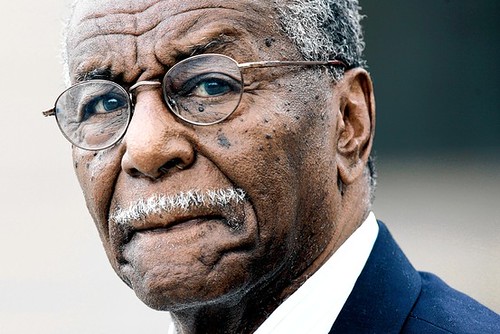
Rev. Fred Shuttlesworth of the Alabama Civil Rights Movement passed on at the age of 89. He risked his life for years for fundamental civil and human rights., a photo by Pan-African News Wire File Photos on Flickr.
OCTOBER 6, 2011
Fred Shuttlesworth 1922-2011
Alabama Pastor Relished Fight Against Segregation
By STEPHEN MILLER
Associated Press
Fred Shuttlesworth's long series of confrontations with Birmingham Commissioner of Public Safety Eugene "Bull" Connor over segregation laws made the Alabama city one of the pivotal battlegrounds of the civil-rights movement.
A founder of the Southern Christian Leadership Conference, Mr. Shuttlesworth was a Baptist minister whom Martin Luther King Jr. once called "the most courageous civil-rights fighter in the South."
Mr. Shuttlesworth tried to enroll his kids in a segregated school, led lunch-counter sit-ins and organized the Selma-to-Montgomery march of 1965. He was a main organizer of the Freedom Rides. When Mr. Shuttlesworth was arrested for parading without a permit during a 1963 demonstration in Birmingham, he appealed his conviction to the U.S. Supreme Court, where Birmingham's law was struck down.
The activist, who died Wednesday at age 89, faced violence from people resisting his crusade; he was beaten senseless by Klansmen, and his wife was stabbed. In 1956, a bomb destroyed his house. But in response to advice to leave town, Mr. Shuttlesworth replied, "I wasn't saved to run."
Ralph Luker, a civil-rights historian in Atlanta, said Mr. Shuttlesworth had "crazy courage."
A native of Oxmoor, Ala., Mr. Shuttlesworth early on developed a reputation for determination and volatility. In 1941, he was convicted of running his family's still. He found work as a truck driver and built a home for his young wife out of World War II scrap metal.
He later attended an unaccredited Bible academy and then Selma University, a black Baptist institution, and what is now Alabama State University. He seemed to chafe wherever he went, and didn't get along with the deacons at his first pastorate, in Selma.
In 1953, Mr. Shuttlesworth became pastor of Bethel Baptist Church in Birmingham, where he immediately began challenging segregation by pressing the city to hire black police officers. He joined the NAACP, and when Alabama outlawed the rights group, Mr. Shuttlesworth founded the Alabama Christian Movement for Human Rights—a direct provocation to Mr. Connor.
A year after Rosa Parks challenged segregation on buses in Montgomery, Mr. Shuttlesworth announced he and his congregation would begin sitting at the front of Birmingham's buses on Dec. 26, 1956. On Christmas Day, someone detonated several sticks of dynamite that destroyed Mr. Shuttlesworth's house while he was in bed, yet he escaped with a bump on the head.
The next day, he led the bus protest.
For the next seven years, Mr. Shuttlesworth challenged Birmingham's segregation laws with civil disobedience and boycotts of local businesses. His run-ins with Mr. Connor, who repeatedly provoked and arrested him, became the stuff of civil-rights legend.
A fighter who once proclaimed he would "kill segregation or be killed by it," Mr. Shuttlesworth criticized Dr. King for his "flowery speeches" in lieu of direct action. But the two could work closely.
In 1963, he convinced Dr. King to come to Birmingham to participate in landmark protests at which Mr. Connor turned fire hoses and police dogs on demonstrators. The incident, caught on national television, helped sway public opinion and set in motion the Civil Rights Act of 1964.
By that time, Mr. Shuttlesworth had split with his Birmingham congregation and moved on to a new pastorate in Cincinnati. He remained a major figure in protests in the South, including a widely publicized "wade-in" at a segregated beach in St. Augustine, Fla., in 1965.
In Cincinnati, he started a foundation that helped poor families afford houses, but largely dropped out of the news after the 1960s. In 2004, when the Southern Christian Leadership Conference was beset with administrative problems, Mr. Shuttlesworth returned as interim president but resigned soon after.
"Martin Luther King Jr. got the credit because he wrote the 'Letter from the Birmingham Jail,' but he would not have been in jail if it was not for Fred Shuttlesworth," said Andrew Young, a former United Nations ambassador and Atlanta mayor who helped organize the 1963 Birmingham protests.
"If anybody deserves credit for delivering America a civil-rights bill in 1964, it's Fred Shuttlesworth."
—Cameron McWhirter contributed to this article.
Write to Stephen Miller at remembrances@wsj.com
No comments:
Post a Comment